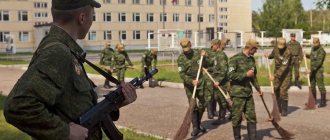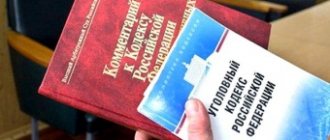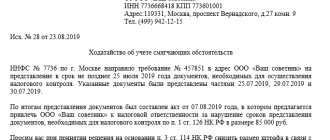New edition of Art. 63 of the Criminal Code of the Russian Federation
1. The following are recognized as aggravating circumstances:
a) relapse of crimes;
b) the onset of grave consequences as a result of the commission of a crime;
c) committing a crime as part of a group of persons, a group of persons by prior conspiracy, an organized group or a criminal community (criminal organization);
d) a particularly active role in the commission of a crime;
e) involvement in the commission of a crime of persons who suffer from severe mental disorders or are in a state of intoxication, as well as persons who have not reached the age at which criminal liability begins;
f) committing a crime based on political, ideological, racial, national or religious hatred or enmity, or based on hatred or enmity against any social group;
f.1) committing a crime out of revenge for the lawful actions of other persons, as well as in order to hide another crime or facilitate its commission;
g) commission of a crime against a person or his relatives in connection with the performance of official activities by this person or the performance of a public duty;
h) committing a crime against a woman who is known to be pregnant by the perpetrator, as well as against a minor, another defenseless or helpless person or a person dependent on the perpetrator;
i) committing a crime with particular cruelty, sadism, mockery, and torture for the victim;
j) committing a crime with the use of weapons, ammunition, explosives, explosive or simulating devices, specially manufactured technical means, narcotic drugs, psychotropic, potent, poisonous and radioactive substances, medicinal and other chemical and pharmacological preparations, as well as with the use of physical or mental coercion;
k) committing a crime during a state of emergency, natural or other public disaster, as well as during mass riots, in conditions of armed conflict or military action;
l) committing a crime using the trust placed in the perpetrator by virtue of his official position or contract;
m) committing a crime using the uniform or documents of a government representative;
o) commission of a deliberate crime by an employee of an internal affairs body;
o) commission of a crime against a minor (minor) by a parent or other person who is charged by law with the responsibility for raising the minor (minor), as well as by a teacher or other employee of an educational organization, medical organization, organization providing social services, or other organization, obligated to supervise the minor (minor);
p) committing a crime for the purpose of promoting, justifying and supporting terrorism.
1.1. The judge (court) imposing punishment, depending on the nature and degree of public danger of the crime, the circumstances of its commission and the identity of the perpetrator, may recognize as an aggravating circumstance the commission of a crime while intoxicated caused by the use of alcohol, narcotic drugs, psychotropic substances or their analogues, new potentially dangerous psychoactive substances or other intoxicating substances.
2. If an aggravating circumstance is provided for by the relevant article of the Special Part of this Code as a sign of a crime, it in itself cannot be taken into account again when assigning punishment.
What are aggravating circumstances
As mentioned above, these are certain factors in which the need to impose a more severe punishment is recognized due to the gravity of the crime committed.
Why does the court always take them into account? The fact is that they vividly characterize the personality of the criminal, his motives and sometimes the reasons why he decided to commit a crime.
Aggravating circumstances of criminal punishment are divided into two types:
- specific to a particular offense;
- general and applicable to everyone.
The presence of aggravating circumstances implies a tougher punishment.
The former are included in the qualifying elements of the crime, and the latter are listed in Article 63 of the Criminal Code of the Russian Federation. These include:
- repeat offense (when the offender has previously committed a similar crime under the conditions that his criminal record has not yet been expunged, or it has not been expunged, according to Article 18 of the Criminal Code of the Russian Federation);
- as a result of what happened, grave consequences occurred for the victim or other persons (they are determined by the judge, but usually they include the death of a person, his suicide, damage to health, etc. At the same time, the intentionality of their infliction is not the determining condition in this situation , but only the threat of their application is not a circumstance aggravating criminal liability);
- group commission of an offense ( a group of persons means a number of people - from 2 );
- the criminal played a major role in the crime ( usually the perpetrator or organizer );
- inducing mentally ill or intoxicated people to commit an offense, as well as those who have not reached the age of 18 (this indicates that the person is trying to avoid responsibility for his act. There is one important nuance here: if the crime itself was carried out a teenager or a mentally ill person, that is, those who cannot be held responsible for their actions, then either do not answer for the violation at all or in a partial form, while a citizen under alcohol cannot count on the same);
- hatred or enmity based on racial, religious and other prejudices;
- if it was carried out out of revenge or to cover up tracks;
- the crime was committed because the victim carried out certain types of activities ( individual entrepreneur, testifying in court, etc. This can also include various types of atrocities against the victim’s relatives);
- the citizen committed an offense against a pregnant woman, a child or any other person who could not resist him (in psychology it is determined that any mentally healthy person cannot harm someone who is not able to respond to him. If the individual allowed himself to cross this trait, then this indicates his strong moral degradation);
- the crime was committed with particular cruelty or torture for the victim (this includes both moral and physical damage);
- it took place with the use of explosives, chemicals or narcotic substances;
- the atrocity occurred during an emergency (these include riots, armed actions, terrorist attacks, epidemics, etc. );
- the offender took advantage of the fact that the victim trusted him due to his official position or other factors;
- he used documents or a form that only law enforcement officers have (this also involves discrediting government officials);
- the crime was carried out by a person working in the internal organs department;
- executed in relation to a teenager by a person who was obliged to bear responsibility for him (guardians, parents, teachers, etc.);
- the crime is in one way or another connected with terrorist activities.
In 2013, Federal Law No. 270 , which states that being under the influence of alcohol now refers to circumstances that aggravate the guilt of the offender, taking into account whether the court considers this necessary.
Only those circumstances listed in Article 63 of the Criminal Code of the Russian Federation are considered aggravating.
The fact that the accused citizen himself does not admit his guilt does not apply to the above list.
Let’s say that when considering a case in court, the jury admitted the defendant’s guilt, but determined the possibility of applying a reduced type of punishment to him. Will punishment be imposed under aggravating circumstances? No, in this case they will not be taken into account.
It is also very important to know that if, according to the Special Part of the Criminal Code of the Russian Federation, the list of aggravating circumstances is a sign of the crime itself, then for the second time, under Article 63 of the Criminal Code of the Russian Federation, it will not be taken into account.
It should also be borne in mind that the above list is exhaustive, that is, any factor not included in it cannot be an aggravating factor.
Article 63 of the Criminal Code of the Russian Federation. Aggravating circumstances (current version)
1. The following are recognized as aggravating circumstances:
a) relapse of crimes;
b) the onset of grave consequences as a result of the commission of a crime;
c) committing a crime as part of a group of persons, a group of persons by prior conspiracy, an organized group or a criminal community (criminal organization);
d) a particularly active role in the commission of a crime;
e) involvement in the commission of a crime of persons who suffer from severe mental disorders or are in a state of intoxication, as well as persons who have not reached the age at which criminal liability begins;
f) committing a crime based on political, ideological, racial, national or religious hatred or enmity, or based on hatred or enmity against any social group;
f.1) committing a crime out of revenge for the lawful actions of other persons, as well as in order to hide another crime or facilitate its commission;
g) commission of a crime against a person or his relatives in connection with the performance of official activities by this person or the performance of a public duty;
h) committing a crime against a woman who is known to be pregnant by the perpetrator, as well as against a minor, another defenseless or helpless person or a person dependent on the perpetrator;
i) committing a crime with particular cruelty, sadism, mockery, and torture for the victim;
j) committing a crime with the use of weapons, ammunition, explosives, explosive or simulating devices, specially manufactured technical means, narcotic drugs, psychotropic, potent, poisonous and radioactive substances, medicinal and other chemical and pharmacological preparations, as well as with the use of physical or mental coercion;
k) committing a crime during a state of emergency, natural or other public disaster, as well as during mass riots, in conditions of armed conflict or military action;
l) committing a crime using the trust placed in the perpetrator by virtue of his official position or contract;
m) committing a crime using the uniform or documents of a government representative;
o) commission of a deliberate crime by an employee of an internal affairs body;
o) commission of a crime against a minor (minor) by a parent or other person who is charged by law with the responsibility for raising the minor (minor), as well as by a teacher or other employee of an educational organization, medical organization, organization providing social services, or other organization, obligated to supervise the minor (minor);
p) committing a crime for the purpose of promoting, justifying and supporting terrorism.
1.1. The judge (court) imposing punishment, depending on the nature and degree of public danger of the crime, the circumstances of its commission and the identity of the perpetrator, may recognize as an aggravating circumstance the commission of a crime while intoxicated caused by the use of alcohol, narcotic drugs, psychotropic substances or their analogues, new potentially dangerous psychoactive substances or other intoxicating substances.
2. If an aggravating circumstance is provided for by the relevant article of the Special Part of this Code as a sign of a crime, it in itself cannot be taken into account again when assigning punishment.
How much does the punishment change in the presence of aggravating circumstances?
In each individual case, the degree of aggravating consequences of the crime is considered differently, since there are no absolutely identical crimes.
For example, when considering a crime committed by an organized group, the degree and extent of participation of each offender who took part in the crime is taken into account. The actions of the performer and organizer are punished more severely, and their accomplices less severely.
If it is established that the group was created by prior conspiracy, then it is already determined that the crime was committed by a criminal community.
When reoffending, the court takes into account factors such as the nature of the previous crime, the reasons for the insufficient impact of the punishment for it and the severity of the crime committed. At the same time, the existence of a connection between the past and present cases and how much time has passed between the first and second are also considered.
You can read about what rights a person has when detained.
For such a crime, ⅓ of the maximum period provided for it is assigned, but within the limits of the relevant article of the Special Part of the Criminal Code of the Russian Federation. If at the time of its commission there were mitigating circumstances, then less than ⅓ .
Aggravating circumstances are applied if certain conditions are met under the Criminal Code of the Russian Federation.
Let's say the criminal did not have time to finish his crime. In this case, the minimum amount of punishment is derived from the upper limit, which is specified in Article 66 of the Criminal Code of the Russian Federation.
If by the time the second crime is committed, the offender’s criminal record for the previous crime has already expired, then this will no longer be considered an aggravating circumstance.
If an intentional crime entailed serious consequences for the victim, then the court, when assigning punishment, takes into account their degree and measure. The amount of punishment in this case consists of two components:
- the minimum term for the crime itself;
- and he is also for committing a crime using extreme cruelty.
There are cases when an atrocity took place with a whole complex of various aggravating circumstances accompanying it. In this case, according to Article 63 of the Criminal Code of the Russian Federation, the size of the preventive measure consists of those periods that are assigned for each of them. If there were more than three of them, then the total period must be no less than the sum of all periods intended for them under the legislation of the Russian Federation.
All aggravating circumstances must be taken into account by the court when pronouncing the final sentence on the criminal, even if they were not taken into account when drawing up the indictment.
Is it possible to prove the absence of aggravating circumstances to reduce the punishment?
This can be done first of all if you have a good lawyer who can help the offender in court.
If the matter concerns relapse, then it is important to take into account this nuance: despite the fact that having a criminal record is the second important component of recidivism, these are not unambiguous concepts. This means that a criminal record in itself cannot be an aggravating circumstance , so here you can argue with the court if it decides otherwise.
Also, according to the decision of the Plenum of the Supreme Court of the Russian Federation, in order to recognize the fact of recidivism, it is required that the citizen have an unexpired conviction for an intentional crime.
How to file a police report? You can read about it here.
Let's say a person has committed a serious crime, but he has a criminal record for a crime of minor gravity. Will this be considered a relapse? No, but if it was intentional, then yes.
When considering cases in which it is indicated that the offender played a particularly active role in committing a crime against other persons, it is necessary to specify exactly how he did this. This could be the involvement of other persons in a crime, leadership, etc. In the absence of such clarifications, the lawyer can achieve the removal of this fact from the case.
It is always important to compare what the judge or prosecutor is trying to present with what is stated directly in the legislative act itself.
It is necessary to carefully compare what the court considers as an aggravating circumstance and what is specified in the Criminal Code of the Russian Federation.
For example, when considering a similar circumstance as the use of a law enforcement officer’s uniform, the court may consider any similar uniform to be it. However, Part 1 of Article 63 of the Criminal Code of the Russian Federation contains quite precise wording in this regard, so there is an opportunity to challenge the court’s decision.
It is also possible to challenge such a factor as inducing mentally ill persons to commit a crime. It is important to remember the definition of “mental disorder”. It is interpreted as a congenital or acquired mental disorder, regardless of the presence of legal capacity. That is, you need to immediately consult a psychiatrist if they try to apply this circumstance in court.
Particular attention is paid to such a grave consequence as committing a crime in revenge for the legal actions of third parties. Here, too, it is important to follow exactly the interpretation contained in Article 63 of the Criminal Code of the Russian Federation. The reason for the crime must be precisely the desire of the criminal to take revenge for the previously completely lawful actions of the person against whom he committed the malicious act.
The fact that a citizen committed an offense against a pregnant woman or a person who could not fight back can also be disputed. It applies only if the accused actually knew about the woman's condition or that the individual was unable to resist it.
You should also hire a good lawyer if you know that the court will try to charge you with aggravating circumstances.
In each individual case, as can be deduced from all of the above, you need to follow exactly the letter of the law. The court may consider this or that circumstance accompanying the crime differently; it cannot deviate from the normative legal acts on which it is obliged to act.
Not the least important role for the court is played by the personality of the criminal himself , and this, like nothing else, is characterized by aggravating circumstances. For example, committing a crime with particular cruelty may indicate that the criminal takes pleasure in the torture he commits on the victim, which in turn means for the court that such a person is a social danger.
Murder under aggravating circumstances (Part 2 of Article 105 of the Criminal Code of the Russian Federation)
Criminal law elements of murder (Part 1 of Article 105 of the Criminal Code of the Russian Federation).
Life as an object of legal encroachment and as a certain physiological. a state has a time frame outlined by its initial and final moments. Their correct definition is important for distinguishing murder from such crimes. types of behavior such as illegal abortion, failure to provide assistance to a person in a life-threatening condition, criminally punishable transplantation of organs and tissues, attempt on an unfit object.
The initial moment of a person's life. is associated with the complete separation of the fetus from the mother’s womb and the first breath of the newborn, and the final one is associated with the complete cessation of the supply of oxygen to the body’s tissues and the subsequent irreversible processes of decay of cells of the central nervous system.
Murder means intentionally causing the death of another person.
The object of the encroachment is the life of another person and the social relations of which he acts as a subject.
The objective side of murder:
1) an act, which can be either in the form of action or inaction, aimed at causing the death of another person;
2) as a result of this act, socially dangerous consequences must occur in the form of the death of another person;
3) there must be a necessary causal connection between the act and the consequences.
Material composition - the murder is considered completed from the moment of the death of the victim. It does not matter when death occurred: immediately or after some time. Actions of a person directly aimed at causing the death of another person, if due to circumstances beyond the control of the perpetrator they did not lead to this result, are qualified as attempted murder.
The subject of the murder is a sane individual who has reached the age of 14 years.
The subjective side of murder is characterized by guilt in the form of direct or indirect intent. Attempted murder is possible only with direct intent.
On the subjective side, murder differs from the intentional infliction of grievous bodily harm resulting in the death of the victim, in that in murder the intent of the perpetrator is aimed at depriving the victim of life, and in the commission of a crime under Part 4 of Art. 111 of the Criminal Code of the Russian Federation, the attitude of the perpetrator towards the death of the victim is expressed in negligence.
- simple - murder without qualifying or privileged characteristics (Part 1 of Article 105 of the Criminal Code of the Russian Federation);
- from 6 to 15 years with or without restriction of freedom for up to 2 years.
Murder under aggravating circumstances (Part 2 of Article 105 of the Criminal Code of the Russian Federation).
In Part 2 of Art. 105 of the Criminal Code of the Russian Federation formulates the types of qualified murder, or murder with aggravating circumstances.
A) Murder of two or more persons.
In accordance with the provisions of Part 1 of Art. 17 of the Criminal Code of the Russian Federation, the murder of two or more persons, committed simultaneously or at different times, does not form a set of crimes and is subject to qualification under paragraph “a” of Part 2 of Art. 105 of the Criminal Code of the Russian Federation, and if there are grounds for this, also under other points of part 2 of this article, provided that the perpetrator has not previously been convicted of any of these murders.
The murder of one person and the attempted murder of another cannot be considered a completed crime - the murder of two persons. In such cases, regardless of the sequence of criminal actions, the act should be qualified under Part 1 or Part 2 of Art. 105 and according to Part 3 of Art. 30 and paragraph “a”, part 2, art. 105 of the Criminal Code of the Russian Federation. The actions of the perpetrator in the murder of two or more persons must be covered by a single intent.
B) The murder of a person or his relatives in connection with the performance of official activities by this person or the performance of a public duty.
This murder is committed with the aim of preventing the person from lawfully carrying out his official activities or fulfilling his public duty, or for reasons of revenge for such activities.
The performance of official activities should be understood as the actions of a person included in the scope of his duties arising from an employment agreement (contract) with state, municipal, private and other duly registered enterprises and organizations, regardless of the form of ownership, with entrepreneurs whose activities do not contradict the current legislation, and under the fulfillment of public duty - the implementation by a citizen of both the duties specifically assigned to him in the interests of society or the legitimate interests of individuals, and the commission of other socially useful actions (suppression of offenses, reporting to authorities about a committed or impending crime or the whereabouts of a wanted person in connection with the commission of offenses, giving evidence by a witness or victim incriminating a person in committing a crime, etc.).
Persons close to the victim, along with close relatives, may include other persons who are related to him or her (relatives of the spouse), as well as persons whose life, health and well-being are known to the perpetrator to be dear to the victim due to established personal relationships.
C) The murder of a minor or another person, known to the perpetrator to be in a helpless state, and also associated with the kidnapping of a person;
The murder of a minor or another person who is known to be in a helpless state by the perpetrator must be qualified as the intentional infliction of death on a victim who is unable, due to a physical or mental state, to defend himself or to provide active resistance to the perpetrator, when the latter, while committing the murder, is aware of this circumstance. Other persons in a helpless state may include, in particular, seriously ill people, the elderly, and persons suffering from mental disorders that deprive them of the ability to correctly perceive what is happening.
When qualifying the actions of the perpetrator under paragraph “c” of Part 2 of Art. 105 of the Criminal Code of the Russian Federation on the basis of “murder associated with kidnapping or hostage-taking”, it should be borne in mind that, within the meaning of the law, liability under this paragraph of Part 2 of Art. 105 of the Criminal Code of the Russian Federation is punishable not only for intentionally causing the death of the kidnapped person or hostage, but also for the murder of other persons committed by the perpetrator in connection with the kidnapping or hostage-taking. The act must be qualified in conjunction with the crimes provided for in Art. 126 or art. 206 of the Criminal Code of the Russian Federation.
D) Women who are known to be pregnant by the perpetrator;
D) Murder with extreme cruelty;
When qualifying a murder under paragraph “d” of Part 2 of Art. 105 of the Criminal Code of the Russian Federation must be based on the fact that the concept of special cruelty is associated both with the method of murder and with other circumstances indicating the manifestation of special cruelty by the perpetrator. At the same time, in order to recognize a murder as committed with particular cruelty, it is necessary to establish that the intent of the perpetrator included committing the murder with particular cruelty.
A sign of special cruelty is present, in particular, in cases where, before the deprivation of life or in the process of committing a murder, the victim was subjected to torture, torture or mockery of the victim, or when the murder was committed in a way that the perpetrator knows is associated with causing special suffering to the victim (causing great number of bodily injuries, the use of painful poison, burning alive, prolonged deprivation of food, water, etc.). Particular cruelty can be expressed in committing a murder in the presence of people close to the victim, when the perpetrator was aware that his actions were causing them special suffering.
E) Murder committed in a generally dangerous manner;
A generally dangerous method of murder (clause “e” of Part 2 of Article 105 of the Criminal Code of the Russian Federation) should be understood as a method of intentionally causing death, which the perpetrator knows to pose a danger to the life of not only the victim, but at least one other person (for example, by means of an explosion , arson, firing shots in crowded places, poisoning water and food that other people besides the victim use).
If, as a result of the generally dangerous method of murder used by the perpetrator, the death of not only a certain person, but also other persons, occurred, the act must be qualified, in addition to paragraph “e” of Part 2 of Art. 105 of the Criminal Code of the Russian Federation, under paragraph “a”, part 2 of Art. 105 of the Criminal Code of the Russian Federation, and in case of harm to health to other persons - under paragraph “e” of Part 2 of Art. 105 of the Criminal Code of the Russian Federation and under articles of the Criminal Code of the Russian Federation providing for liability for intentional infliction of harm to health.
E.1) Based on blood feud;
G) Committed by a group of persons, a group of persons by prior conspiracy or an organized group;
Murder is recognized as committed by a group of persons when two or more persons, acting together with intent aimed at committing murder, directly participated in the process of taking the life of the victim, using violence against him, and it is not necessary that the injuries leading to death were caused by each of them ( for example, one suppressed the victim’s resistance, deprived him of the opportunity to defend himself, and the other inflicted fatal injuries on him). Murder should be recognized as committed by a group of persons even in the case when, in the process of one person committing actions aimed at intentionally causing death, another person (other persons) joined him for the same purpose.
A preliminary conspiracy to murder presupposes an agreement expressed in any form between two or more persons, which took place before the commencement of actions directly aimed at taking the life of the victim. At the same time, along with co-perpetrators of the crime, other members of the criminal group may act as organizers, instigators or accomplices of murder, and their actions should be qualified under the relevant part of Art. 33 and paragraph “g”, part 2, art. 105 of the Criminal Code of the Russian Federation.
An organized group is a group of two or more individuals united by the intent to commit one or more murders. As a rule, such a group carefully plans a crime, prepares murder weapons in advance, and distributes roles between group members. Therefore, when a murder is recognized as committed by an organized group, the actions of all participants, regardless of their role in the crime, should be qualified as co-perpetrator without reference to Art. 33 of the Criminal Code of the Russian Federation.
H) Murder for mercenary motives or for hire, as well as associated with robbery, extortion or banditry;
According to paragraph “h” of Part 2 of Art. 105 of the Criminal Code of the Russian Federation (murder for mercenary motives) should qualify a murder committed with the aim of obtaining material benefits for the perpetrator or other persons (money, property or rights to receive it, rights to living space, etc.) or getting rid of material costs (refund property, debt, payment for services, fulfillment of property obligations, payment of alimony, etc.).
A murder caused by the receipt by the perpetrator of the crime of material or other reward should be classified as murder for hire. Persons who organized a murder for reward, instigated its commission or assisted in the commission of such a murder are liable under the relevant part of Art. 33 and paragraph “h”, part 2, art. 105 of the Criminal Code of the Russian Federation.
Murder in the process of committing these crimes should be classified as involving robbery, extortion or banditry. What was done in such cases is qualified under paragraph “h” of Part 2 of Art. 105 of the Criminal Code of the Russian Federation in conjunction with articles of the Criminal Code providing for liability for robbery, extortion or banditry.
I) Murder for hooligan reasons;
According to paragraph “and” part 2 of Art. 105 of the Criminal Code of the Russian Federation should qualify murder committed on the basis of obvious disrespect for society and generally accepted moral norms, when the behavior of the perpetrator is an open challenge to public order and is caused by the desire to oppose himself to others, to demonstrate a disdainful attitude towards them (for example, deliberately causing death for no apparent reason or with using a minor reason as a pretext for murder).
If the culprit, in addition to murder for hooligan motives, committed other deliberate actions that grossly violated public order, expressed clear disrespect for society and were accompanied by the use of violence against citizens or the threat of its use, as well as the destruction or damage of other people’s property, then what he did should be qualified according to the law. "and" part 2 art. 105 of the Criminal Code of the Russian Federation and the corresponding part of Art. 213 of the Criminal Code of the Russian Federation.
To correctly distinguish between murder for hooligan reasons and murder in a quarrel or fight, it is necessary to find out who initiated it, and whether the conflict was provoked by the perpetrator to use it as a pretext for murder. If the instigator of a quarrel or fight was the victim, as well as in the case where the conflict was caused by his illegal behavior, the perpetrator cannot be held responsible for murder for hooligan motives.
K) In order to hide another crime or facilitate its commission, as well as involving rape or sexual assault;
Within the meaning of the law, qualification under paragraph “k” of Part 2 of Art. 105 of the Criminal Code of the Russian Federation, the murder of a certain person committed by the perpetrator in order to conceal another crime or facilitate its commission excludes the possibility of qualifying the same murder, in addition to the specified paragraph, under any other paragraph of Part 2 of Art. 105 of the Criminal Code of the Russian Federation, which provides for a different purpose or motive for murder. Therefore, if it is established that the murder of the victim was committed, for example, for mercenary or hooligan motives, it cannot simultaneously be qualified under paragraph “k” of Part 2 of Art. 105 of the Criminal Code of the Russian Federation.
Murder involving rape or violent acts of a sexual nature should be understood as murder in the process of committing these crimes or for the purpose of concealing them, as well as committed, for example, out of revenge for resistance provided during the commission of these crimes.
Considering that in this case two independent crimes are committed, the crime should be qualified under paragraph “k” of Part 2 of Art. 105 of the Criminal Code of the Russian Federation and, depending on the specific circumstances of the case, under the relevant parts of Art. 131 or Art. 132 of the Criminal Code of the Russian Federation.
K) For reasons of political, ideological, racial, national or religious hatred or enmity, or for reasons of hatred or enmity towards any social group;
M) For the purpose of using the victim’s organs and tissues;
The object of the encroachment is the life of another person and the social relations of which he acts as a subject.
The objective side of murder:
1) an act, which can be either in the form of action or inaction, aimed at causing the death of another person;
2) as a result of this act, socially dangerous consequences must occur in the form of the death of another person;
3) there must be a necessary causal connection between the act and the consequences.
Material composition - the murder is considered completed from the moment of the death of the victim. It does not matter when death occurred: immediately or after some time. Actions of a person directly aimed at causing the death of another person, if due to circumstances beyond the control of the perpetrator they did not lead to this result, are qualified as attempted murder.
The subject of the murder is a sane individual who has reached the age of 14 years.
The subjective side of murder is characterized by guilt in the form of direct or indirect intent. Attempted murder is possible only with direct intent.
Murder under mitigating circumstances (Article 106-108 of the Criminal Code of the Russian Federation).








